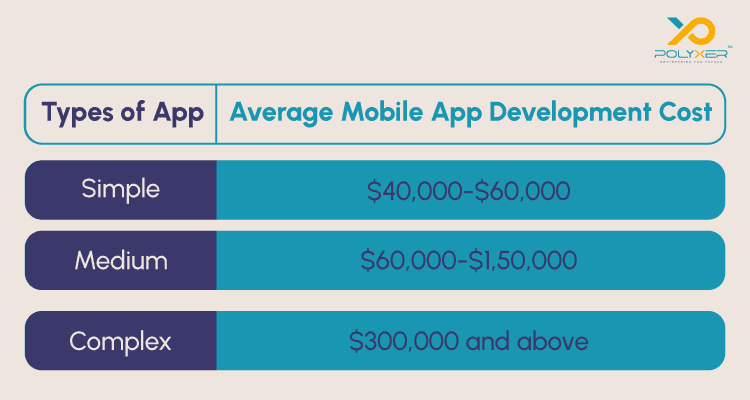
The Roadmap To A Successful Cloud Strategy: Steps To Implementation

Exploring Different Types of QA Methods: An Overview
As businesses vie for more growth and success every day, it has become crucial today to facilitate handly services to their customers. By handly services, we mean to give your customers access to all your services or products from one mobile application.
Building a mobile application for business is truly intriguing. A mobile app undoubtedly comes with sturdy benefits, but on the other hand, it also poses challenges for businesses to build it.
Building a mobile app and keeping up with its changing demands is not so easy. One of the major factors affecting business decisions is the cost of developing a mobile app. The mobile app cost varies on the features, app complexity, and platforms to build it on.
There can’t be any fixed cost for mobile app development, but we can take you around the estimated range with the help of cost-affecting factors of mobile app development.
Let’s learn from the basics!
What is a Mobile Application?
A mobile application, often simply called an app, is a software program designed to run on a mobile device such as a smartphone or tablet. Unlike traditional desktop software, mobile apps are typically smaller, focused on specific tasks, and optimized for touch-based interaction on smaller screens.
Here’s the breakdown of some key points of mobile apps:
- Provide specific services or functionalities tailored for mobile devices.
- Can perform tasks similar to desktop applications but optimized for the smaller screen and touch interface of mobile devices.
- Often focuses on single, well-defined purposes, unlike the broader scope of desktop applications.
How Mobile Application is Built?
Building a mobile application involves a series of steps, including the following:
1. Requirement Analysis
This is the foundation of the entire mobile app development process. It involves understanding the needs of your target audience, identifying the app’s purpose, and outlining its features and functionalities. This phase can involve market research, user interviews, and competitor analysis.
2. Strategy and Planning
Once you have a clear understanding of the requirements, you need to develop a roadmap for bringing your app to life. This includes defining the app's architecture, choosing the right platform, setting a budget, and creating a development timeline.
3. App Design
This phase focuses on the look and feel of your app. It involves creating user interfaces (UIs) and user experiences (UX) that are intuitive, user-friendly, and visually appealing. Design mockups, prototypes, and wireframes are used to iterate and finalize the design before development begins.
4. App Development
Here’s where the coding magic happens. Developers bring the app’s design to life using programming languages specific to the chosen platform. This stage involves building the app’s functionalities, integrating any necessary APIs or services, and ensuring data security.
5. Testing and Deployment
Before releasing the app to the world, it’s crucial to test it thoroughly. This involves identifying and fixing bugs, ensuring compatibility with different devices and operating systems, and optimizing performance. Once all issues are resolved, the app can be deployed to the respective app store.
6. Maintenance
Building an app is just the beginning. Mobile apps require ongoing maintenance to fix bugs, add new features, and adapt to changes in technology and user needs. This can involve updates, bug fixes, and continuous monitoring of app performance.
Advantages of Business Mobile Application
1. Improved Customer Relationships
Mobile apps provide a direct line of communication between businesses and customers, fostering loyalty and engagement. Features like in-app messaging, push notifications, and personalized recommendations can strengthen customer relationships.
2. Better Brand Building
A well-designed mobile app can be an extension of your brand, offering a unique and interactive experience that reinforces the brand’s identity and messaging. This can lead to increased brand awareness and positive brand perception.
3. Additional Marketing Channel
Mobile apps provide an additional platform to reach your target audience with targeted marketing campaigns, promotions, and exclusive content. This can be a cost-effective way to reach new customers and drive engagement.
4. Boost Profits
Mobile apps can facilitate secure in-app purchases, subscriptions, and bookings by streamlining the buying process and leading to increased sales. It also reduces the operation cost by automation through apps and decreases customer service needs.
5. Enhanced Customer Services
Mobile apps can enable self-service features like FAQs, chatbots, and automated troubleshooting to resolve issues quickly. The proactive support of the mobile app is based on user needs to enhance the user experience and customer interactions.
6. Controlled Business Management
Mobile apps provide real-time data and analytics, giving you instant insights into key metrics for informed decision-making. Streamlined processes through automation and enhanced communication and collaboration among team members further empower you to manage your business effectively.
7. Insight Into Customer’s Behaviour
Mobile apps track user actions, revealing what they love, what they ignore, and what makes them tick. This data lets you personalize recommendations, promotions, and even product development, ensuring every interaction hits the mark.
8. Easy Decision-Making
Real-time data empowers informed choices. It helps to track promotions, identify underperforming products, and optimize your app based on user behavior—no more guesswork in decision-making, just data-driven decisions that boost profits and reduce costs.
Types of Mobile Applications
The world of mobile apps is vast and varied, including three main types of mobile apps.
1. Native Apps
Native apps are written in the native language of their platform, like Swift for iOS and Java for Android. This allows them to take full advantage of the device’s features and capabilities.
Native apps feel more integrated with the device and react more naturally to the user’s response. Native apps are built for just one platform and they can not be mixed and matched with other platforms.
Advantages of Native Apps:
- Better and faster performance due to single code specific to the device and OS
- Advanced customization and enhanced user experience
- Fewer bugs
- Instant updating and improved scalability
- Access to all device features
2. Hybrid Apps
Hybrid apps are essentially web apps wrapped in a native apps container. They use web technologies like HTML, CS5, and Javascript for their core functionality, but they’re housed within a native app shell that allows them to access certain device features and offer a more app-like experience.
Advantages of Hybrid Apps:
- Cross-platform compatibility
- Faster development
- Wider reach
- Offline functionality
3. Web apps
Web apps offer a unique approach to the mobile world. Web apps are not downloaded from app stores like native or hybrid apps. Instead, they are essentially mobile-optimized websites accessed through a web browser on any device.
This makes them platform-agnostic, working on Android, iOS, and even on laptops and desktops.
Advantages of Web Apps:
- Platform independence
- No need for App Store approval
- Easy updates
- Low cost of development
Mobile App Development in 2024: Cost Analysis
The Mobile app development industry is a highly competitive industry these days and businesses constantly strive to find a cost-effective solution for their mobile app development needs.
The mobile app development cost can significantly vary depending on your project requirements. The range of mobile app development costs in India starts from 500,000 to 50 million rupees based on the complexity and other features of the app.
However, here is the average cost of mobile app development in India based on the type of app:

The above mobile app development cost is just the surrounding amount as the fixed mobile app development cost can only be known once you clear out your app requirements and features. The mobile app development company you choose for your mobile app also affects the overall cost.
Following are some other factors that significantly affect the cost of mobile app development:
1. Mobile App Type
As you well-read above, mobile apps are divided into three categories - posing various features, app sizes, and functionalities. Hence, the mobile app development costs vary respectively - smaller apps have a single platform with minimal functionalities and lower costs. While the apps with medium or larger sizes have more functionalities in order, costing more accordingly.
2.Marketing Cost and Maintenance
Marketing cost and maintenance of mobile apps are two additional costs to the mobile app development cost. Maintenance of any mobile app is an ongoing cost which is essential to stay updated with the real-time changes. Mobile app maintenance helps to improve the functionalities of an app, while marketing helps you reach your target audience with promotions to stand out in the crowd.
3. App Security Cost
This can’t be skipped! App security is among the highest priorities of any business since the app will store crucial information such as employee credentials, customer details, transaction details, and many more. The app security cost is important to include in the mobile app development cost as it safeguards your data and ensures top security.
4. Platform
Mobile app development cost is directly affected by the device or platform in which it will be built. If you want to build an app for a single platform, it will cost you comparatively less than the cost of building a mobile app for several platforms. The mobile app development cost for Android, iOS, or any other platform differs.
5. App Functionalities and Features
Half of the mobile app development cost is associated with the features and functionalities of the app. Needless to say, it affects the most. The features and functionalities you need in your app decide the cost. Building an app for internal users is less expensive as you won’t require many functionalities, but in the oppose building an app for external users as well, it may cost you more.
6. Mobile App Design
Your mobile app design is what your users will see first and decide its usability with. The mobile app design should be consistent and visually pleasing so that your users find it more interactive and do not get confused by it. The mobile app design depends on the expertise of the app designer, its location, and the design complexity - heavily affecting the overall cost of mobile app development.
7. App Publishing Cost
The cost of releasing your mobile app to the different app stores varies. Every app store charges you distinctly to publish your app. So the cost is based on the number of app stores you want to publish your app to. This influences your mobile app development cost directly.
8. Development Team Expertise
Here comes the main factor - deciding upon all the above factors! The development team you chose for building your app is where mobile app development cost get fixed. The expertise of the development team or mobile app development company will charge you based on their experience and expertise while also looking at your app requirements.
To know how to choose the right mobile app development company, read it down!
Choosing the Right Mobile App Development Company
Behind any successful mobile app, a team of skilled developers works for it. The true going practices of mobile app development are done by expert software developers from any individual mobile app development company.
Choosing the right mobile app development company involves careful consideration of several key factors that are as follows:
1. Their Portfolio
- Look for companies with experience in developing apps similar to yours in terms of complexity, features, and target audience.
- Check the quality of their work, user interface design, and app functionality.
- Read client testimonials and reviews to get a sense of their satisfaction with the company's work.
2. Total Years in the Field
- While experience is important, don't just rely on years in business. Look for companies that have kept up with the latest technologies and trends in mobile app development.
- Consider companies with a strong track record of successful project completions and satisfied clients.
3. The expertise of the Team
- Ensure the company has a team with relevant skills and expertise for your project. This includes developers, designers, project managers, and QA testers.
- Look for certifications and experience in relevant technologies like Android, iOS, Flutter, or React Native.
- Ask about the team's communication skills and ability to collaborate effectively with you.
4. Mobile App Development Cost
- Get clear and transparent quotes upfront, including the scope of work, hourly rates, and any additional fees.
- Be careful of companies offering significantly lower prices, as quality might be compromised.
- Consider the value you're getting for the price, including the mobile app development company's expertise, experience, and post-development support.
5. Post-development Services
- Ask about the company's post-launch support services, such as bug fixes, updates, and maintenance.
- Ensure they provide ongoing support and address any issues that may arise after the app launch.
6. Mobile App Development Technology
- Discuss the technologies the company plans to use for your app development
- Consider your app's requirements and choose a technology that offers the best performance, scalability, and security.
- Ensure the company has experience and expertise in the chosen technology.
7. Timeline Estimates
- Get realistic timeline estimates for different stages of development, including design, development, testing, and launch.
- Be aware that unexpected challenges may arise, so factor in some buffer time.
- Communicate your desired launch date clearly and ensure the company can meet your deadlines.
8. Security
- Ask about the company's security practices and how they protect your data and user information.
- Ensure they comply with relevant data privacy regulations and industry standards.
It’s Effective with Polyxer!
Making you familiar with the whole mobile app development process and idea is our work to help you choose the right mobile app development company for you. Building one mobile app for your business is a big decision and it takes a lot of consideration and insightful analysis to make that one decision. Now if you’ve already made it, let it reach out to us!
Polyxer Systems is a software development company - helping businesses like yours to climb the mountain of success with our all-around software development services including enterprise app development. We have a proficient team of developers to understand your project needs and deliver you the top of it! Make your mobile app development project even more effective with polyxer, connect!







